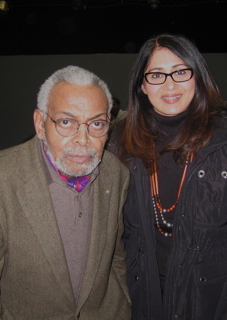met amiri baraka after a performance of his legendary play “dutchman” – rit’s lab theater, dec 13, 2010.
FROM enotes.com:
Dutchman, Amiri Baraka’s shocking one-act play was first presented at the Cherry Lane Theatre in New York City in March, 1964. It won the Obie Award for best off-Broadway play, putting Baraka, who was actively contributing to five other plays at the time, into the public limelight. He was still in his Bohemian phase but would the following year divorce his white wife, move to Harlem, and change his name from LeRoi Jones to Amiri Baraka indicating his new Black Nationalist leanings. Dutchman, written just before this move, is a transitional piece. It carries elements of the dadaist poetry of his Bohemian stage, anti-racist sentiments, and the radical black consciousness-raising that would characterize much of his later work.
Dutchman is an emotionally charged and highly symbolic version of the Adam and Eve story, wherein a naive bourgeois black man is murdered by an insane and calculating white seductress, who is coldly preparing for her next victim as the curtain comes down. The emotionally taut, intellectual verbal fencing between Clay (the black Adam) and Lula (a white Eve) spirals irrevocably to the symbolic act of violence that will apparently repeat itself over and over again. Baraka’s play is one of mythical proportions, a ritual drama that has a sociological purpose: to galvanize his audience into revolutionary action. Dutchman initially played to primarily white audiences, until Baraka moved it to a Harlem theater that he founded in order to reach, and to educate, his intended audience of the black bourgeoisie. Ironically, the Harlem audiences labeled it a white-hating play and the play closed in Harlem due to lack of revenue. But Baraka was now fully established as the roaring black literary lion, and he continued his mission of black consciousness raising through a prolific output of drama, poetry, essays, and political activity.

